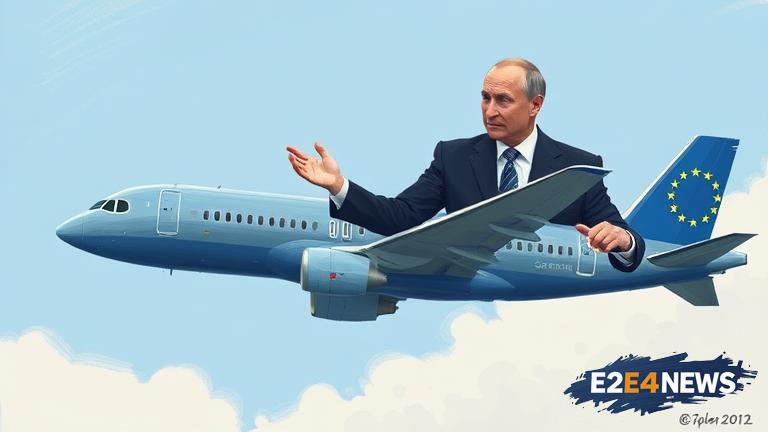A recent report by Bloomberg has revealed that a prominent ally of Russian President Vladimir Putin, who is currently under EU sanctions, was allowed to fly over the European Union to attend a conference in Geneva. This move has sparked controversy and raised questions about the effectiveness of the sanctions imposed on Russian individuals and entities. The sanctioned individual, whose name has not been disclosed, was reportedly permitted to fly over EU airspace despite being subject to travel restrictions. The conference in Geneva, which was attended by the sanctioned ally, was focused on international relations and diplomacy. The event was organized by a reputable institution and featured a range of high-profile speakers and attendees. The presence of the sanctioned individual at the conference has been met with criticism from some quarters, with many arguing that it undermines the purpose of the sanctions. The EU imposed sanctions on the individual in response to Russia’s actions in Ukraine, and the decision to allow them to fly over EU airspace has been seen as a contradiction. The incident has highlighted the complexities and challenges of enforcing sanctions, particularly when it comes to high-profile individuals with significant influence and connections. The EU has faced criticism in the past for its handling of sanctions, with some arguing that they are not being enforced effectively. The decision to allow the sanctioned ally to fly to Geneva has also raised questions about the role of Switzerland in facilitating international diplomacy. Switzerland has a long history of hosting international conferences and diplomatic events, and its neutral status has made it an attractive location for such gatherings. However, the presence of a sanctioned individual at the conference has put Switzerland’s reputation as a neutral host under scrutiny. The incident has also sparked a debate about the effectiveness of sanctions as a tool of foreign policy. While sanctions are intended to pressure countries or individuals into changing their behavior, they can often have unintended consequences. In this case, the decision to allow the sanctioned ally to fly to Geneva has been seen as a sign of weakness and a lack of resolve. The EU has defended its decision, citing the importance of diplomacy and international cooperation. However, the incident has highlighted the need for greater clarity and consistency in the enforcement of sanctions. The controversy surrounding the sanctioned ally’s visit to Geneva has also drawn attention to the broader issue of Russian influence in Europe. Russia has been accused of using its wealth and influence to undermine European institutions and promote its own interests. The presence of a sanctioned individual at the conference has been seen as a manifestation of this influence, and has raised concerns about the extent to which Russia is able to exert its influence in Europe. The incident has also sparked a debate about the role of the EU in promoting democracy and human rights. The EU has long been a champion of these values, but its handling of the sanctions has raised questions about its commitment to upholding them. The controversy surrounding the sanctioned ally’s visit to Geneva has highlighted the need for greater transparency and accountability in the enforcement of sanctions. It has also underscored the importance of diplomacy and international cooperation in promoting peace and stability. As the international community continues to grapple with the challenges posed by Russia’s actions, the incident has served as a reminder of the complexities and nuances of international relations. The EU’s decision to allow the sanctioned ally to fly to Geneva has been seen as a pragmatic move, but it has also raised questions about the long-term consequences of such actions. The incident has highlighted the need for a more nuanced and multifaceted approach to sanctions, one that takes into account the complexities of international relations and the need for diplomacy and cooperation. Ultimately, the controversy surrounding the sanctioned ally’s visit to Geneva has served as a reminder of the challenges and complexities of promoting peace and stability in a rapidly changing world.
